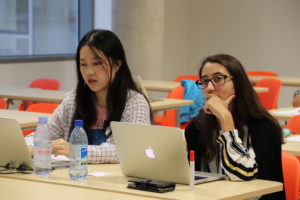Non-Degree / Dates: 14 - 25 July 2025
This course will analyze the formation of global norms and international regimes. It will take a multifaceted approach looking at the role of ideas, institutions, as well as material factors. It will also evaluate the formation of global norms within the context of the changing world order, which is seeing a reduced role for the United States as well as more diversity of regime type and ideologies. This will create multiple problems for the formation of global norms. The role that regions can play in establishing norms and international regimes will be studied. Also, what the changing world order means for the ability of small states to play a part in the formation of norms will be highlighted. Together examples of cyber security norms, environmental, trade, and other norms will be studied in depth.
Reasons for opening the course: The world is currently in turmoil as the post-World War two liberal world order transitions into the great unknown. As non-Western countries grow their influence, the way that global norms and international law are formed will have to adapt. As a member state of NATO and the EU, Estonia has benefited greatly from the liberal world order. Understanding what this change means for Estonia and how a small state like Estonia can operate within it will be one of the goals of the course.
One specific way that Estonia’s budding industries (ICT, health technologies, etc.) have benefited is due to Estonia’s ability to brand itself as an e-state and Estonia’s ability to play a role in the shaping of international norms. Some examples include the Tallinn Manual and the Tallinn Manual 2 which have played an important role in the formation of cyber security norms. Estonia’s participation in the EU and in other diplomatic endeavours have given it a voice on internet governance and other related norms that then enforce Estonia’s brand as an e-state. This brand has a significant spillover impact on the industries in a way that does not show up in the balance sheets of a company or the tax code of the country. This course will help establish what the changing order will mean for the formation of global norms and what processes and actors can play a role in their continued formation. For Estonia, it is critical that it continues to have a global voice and a global image.
Why this course?
Teachers
Tiina Pajuste, PhD, professor, has been working at Tallinn University since 2014. Prior to that, she was a researcher at the Lauterpacht Center for International Law (University of Cambridge). At the same university, she also defended her doctorate in 2012 with the thesis on “Accountability Mechanisms for International Organizations” (supervised by Prof. James Crawford). Tiina Pajuste’s research activities have three main directions (responsibility of international organizations, the role of international law in peace processes and human rights), which share a broader focus – to study the role of (international) institutions in international interactions and collaboration. In her teaching, she places great value on engaging students and learning together.
Matthew Crandall, PhD, is an Associate Professor of International Relations at Tallinn University (Estonia) where he also defended his PhD. He completed a master’s degree in EU-Russian Studies from the University of Tartu (Estonia) and a bachelor’s degree from Brigham Young University in Political Science (USA). He has published in Contemporary Security Policy, Defence Studies, and East European Politics, and his major field of research is small state foreign and security policies.
Timetable
Classes take place from Monday to Friday from 10:00 to 13:15. As an example, please see also the more detailed schedule.
Participants
The course is appealing for a broad base of students, not just those with a law or IR background. Students (bachelor, Master, and PhD) with a variety of educational backgrounds will benefit from the course including those with a background in economics, sociology, history, human geography, political science, and more.
Credit points
Upon full participation and completion of course work students will be awarded 6 ECTS points and a certificate of completion.
Assessment criteria:
Standard academic paper – 80%
Reading reflections – 20%
The course is pass or fail.
Course fee
NB! Accommodation and meals are not included in the price.
| Early-Bird Course Fee (until March 31) | 400€ |
| Regular Course Fee (after March 31) | 440€ |
Scholarships
* The Estonian Ministry of Education and Research and Education and Youth Board offer scholarships to foreign nationals for participation in summer and winter schools in Estonia. Scholarships can be applied by foreign bachelor’s, master’s, and PhD students who have studied in their universities for at least one year (including former study levels). More info and application process details are here.
Contact
Basit Gulzar, Pakistan
The Formation of Global Norms in a Changing World Order #tss2019


